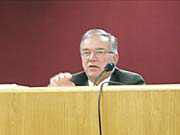Efforts by Councilman John Bueckner to pass a local ordinance prohibiting people from talking on cellular phones while driving through town hit a legal roadblock last week.
Town Attorney Frank Leanza, issuing a written opinion on the matter to the Town Council, said state law did not allow the town to pass such an ordinance, despite the fact that other municipalities around the state have done so.
“I my opinion, after reviewing all the applicable statutes, those towns are violating the law,” Leanza said.
Leanza issued his report at the March 11 meeting, saying that state law allowed municipalities to regulate certain areas of motor vehicle operations. This list includes regulating speed on some streets, designating a one-way street, regulating traffic on congested streets, or stopping traffic in special areas. A town may regulate parking, truck traffic, no passing zones, and a handful of other areas.
Conspicuously missing from this list is the regulation of cellular phone use, Leanza said, noting that police could issue tickets for careless or reckless driving if the cellular phone is involved in an accident or some other dangerous driving situation, but the municipality cannot stop people from talking and driving unless the state passes the law first.
In late February, Police Chief Dennis Corcoran approved of such a ban only if the state would take the initiative. He told the council that people needed consistency, so what is outlawed in Secaucus would have to be illegal in the towns around it.
“Sure, we can enforce the law here,” Corcoran said. “But how can we issue tickets to people coming into town when they can use the cell phones nearly everywhere else? Make no mistake about this; I’m against drivers using cell phones – even the hand-free kind. It is a distraction and it does pose a danger. I’m just not sure we should be enforcing a law here when someone driving along the Turnpike can use their phone, or just across the river in Rutherford.”
“Given Chief Corcoran’s eloquent and practical address to you concerning the need for statewide uniformity on this subject matter, and the unique enforcement problems the same would create for our police department, there is no need to for me to address the same here (in this report),” Leanza wrote.
Bueckner has been seeking a local ban for nearly two years, and was persuaded to delay his request by Mayor Dennis Elwell, who claimed the state was on the verge of implementing such a law.
The state
Gov. James E. McGreevey has promised to sign a ban on cellular telephone use by drivers since he took office two years ago, but has not yet moved on the matter. But the state Department of Transportation has been asked to make recommendations on what the ban should look like, and a state commission is also being formed to study the whether nor it poses a distraction.
In February, prompted by what Bueckner thought was a cellular telephone-related accident on Centre Avenue (as it was not), Bueckner pushed to have the council seek a local law.
He had hoped to use the ordinance as a model for the state, and the council had planned to send copies of the ban to every municipality in the state in order that they might pass similar measures.
In a clear mix-up in communication, the council had authorized in February a resolution to be sent to municipalities and state legislators supporting the bill. But apparently, the two issues were confused and the second resolution never drawn up.
“This is another delay,” Bueckner protested. “We should have had this resolution ready for this meeting so that we could start sending it out.”
The council will likely vote on a resolution supporting a statewide ban on cellular telephone use at its March 25 meeting.
